The Oceania Chapter aims to host a webinar every six weeks, outside of the Annual Chapter Symposium (typically early February) and the International System Dynamics Conference (typically late July).
We welcome nominations for webinars that share research and applications of system dynamics models and systems thinking approaches from academics, PhD students (especially early and pre-completion work) and practitioners. Please reach out to a Policy Council member or email the chapter with your proposed topic.
past webinars
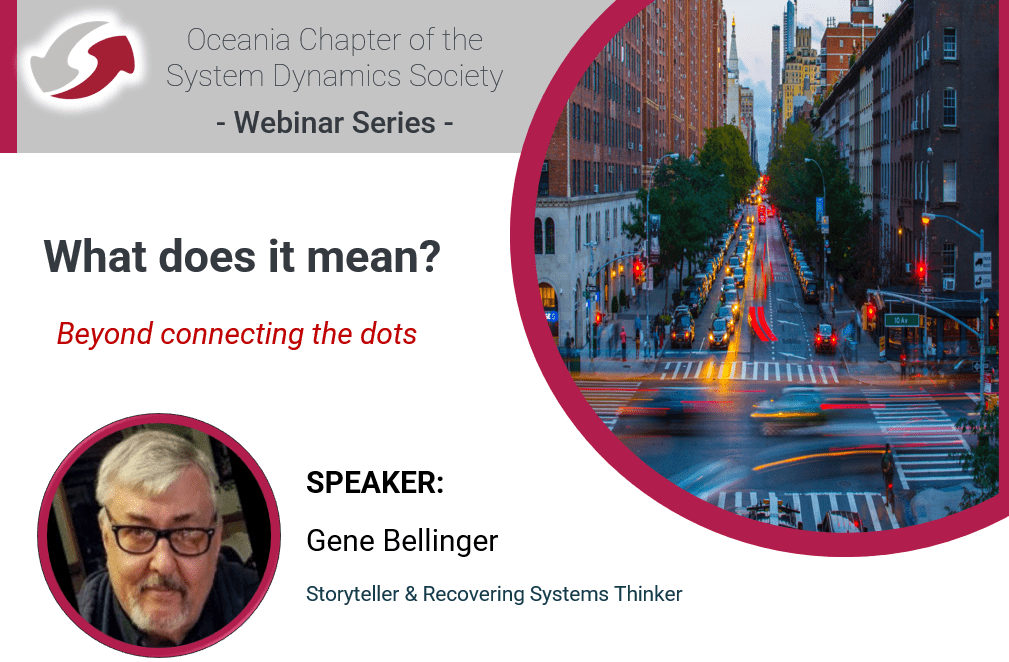
What does it mean? Beyond connecting the dots
ONLINE, Thursday, March 28th 2024, 12:00pm – 1:30pm (AEDT – Sydney time)
by Gene BellingerIn this webinar, Gene will share some of his most memorable ‘aha’-moments that occurred during his almost five decades of searching for understanding on the other side of complexity.
Gene is highly respected member of the systems thinking community, authored hundreds of models and articles, and over 1000 videos on Systems Thinking. He developed Systems-Thinking and SystemsWiki websites and has been a major contributor to the development of Insight Maker and Kumu. In 2013, he co-authored “Beyond Connecting the Dots: Modeling for Meaningful Results” with Scott Fortmann-Roe, the developer of Insight Maker.
Presently, Gene’s effort is expressed in “SystemsWiki’s Musing”, understanding relationships and their implications.
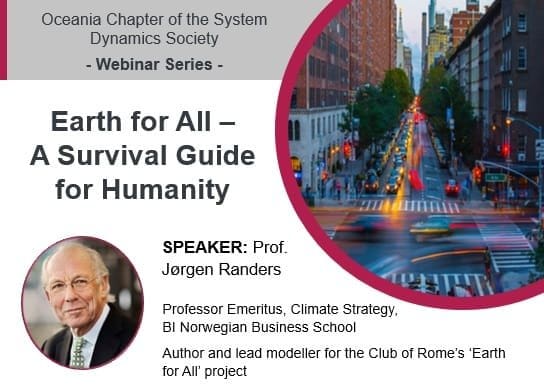
Earth for All – A Survival Guide for Humanity
ONLINE, Wednesday, November 15th 2023, 6:00pm – 7:00pm (AEDT – Sydney time)
by Prof. Jørgen RandersPublished by the Club of Rome 2022, five decades ago, The Limits to Growth shocked the world by showing that population and industrial growth were pushing humanity towards a cliff. Today the world recognizes that we are now at the cliff edge: Earth has crossed multiple planetary boundaries while widespread inequality is causing deep instabilities in societies. There seems to be no way out.
Earth For All is both an antidote to despair and a road map to a better future. Using powerful state-of-the-art computer modeling to explore policies likely to deliver the most good for the majority of people, a leading group of scientists and economists from around the world present five extraordinary turnarounds to achieve prosperity for all within planetary limits in a single generation. Coverage includes:
-
Results of new global modeling that indicates falling well-being and rising social tensions heighten risk of regional societal collapses
-
Two alternative scenarios – Too-Little-Too-Late vs The Giant Leap – and what they mean for our collective future
-
Five system-shifting steps that can upend poverty and inequality, lift up marginalized people, and transform our food and energy systems by 2050
-
A clear pathway to reboot our global economic system so it works for all people and the planet.
An interactive webinar will be delivered in the format of Q&A with Prof. Jørgen Randers. Please watch the following video prior to the webinar: Jørgen Randers – From The Limits to Growth (1972) to Earth for All (2022)
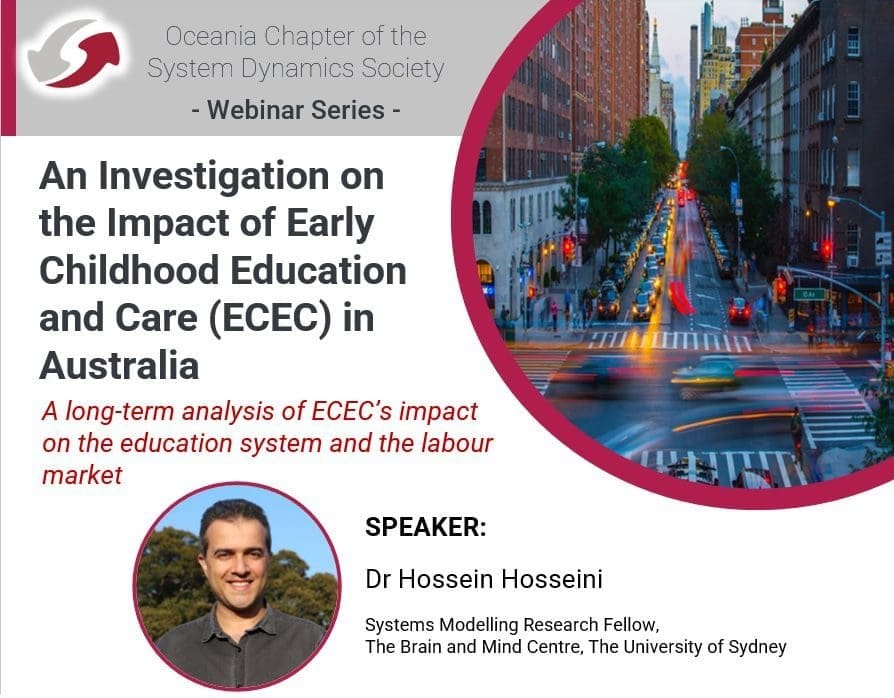
An Investigation on the Impact of Early Childhood Education and Care (ECEC) in Australia: A long-term analysis of ECEC’s impact on the education system and the labour market
ONLINE, Wednesday, August 23rd, 2023, 12:00pm – 1:00pm (AEST – Sydney time)
by Hossein HosseiniWhile evidence supports the role of quality ECEC on child development and school success, and subsequently on contribution to the labour market, the latest published statistics by ABS show that less than 45% of Australian children aged 0-4 years attend formal care.
The outcome of the ECEC system in Australia has mainly been evaluated in terms of its early impact on children based on the Australian version of the Early Development Instrument (AvEDI) (and then on the schooling outcomes). Systems-level interventions are required to facilitate pathways to ECEC given the current growing trends in overseas immigration and increasing costs of ECEC in Australia.
In this webinar, a system dynamics simulation modelling effort will be presented; this model is developed to investigate the impact of ECEC dynamics on Australian schooling performance, tertiary education, and the labour market over time.
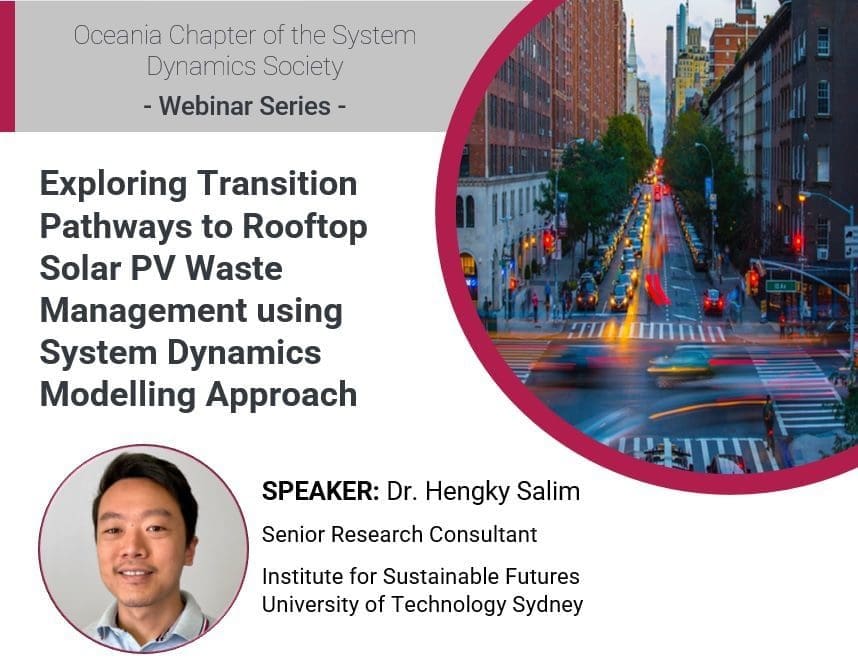
Exploring transition pathways to rooftop solar PV waste management using system dynamics modelling approach
ONLINE, Wednesday, June 7th, 2023, 12:00pm – 1:00pm (AEST – Sydney time)
by Hengky SalimThe adoption of rooftop solar photovoltaic (PV) adoption in Australia has exponentially growing in the past decade. There is a need to promote effective product stewardship for PV panels reaching their end-of-life (EOL). Product stewardship is as an approach to reducing environmental and other impacts of a product by encouraging or requiring manufacturers, importers, distributors and/or other persons to take responsibility for that product. Currently, only European countries have implemented an extended producer responsibility regulation under the Waste Electrical and Electronic Equipment (WEEE) directive. In this webinar, we are going to talk about the development process of a System Dynamics (SD) model for managing EOL rooftop PV panels and how to apply the SD model to explore different scenarios for managing rooftop solar PV waste in Australia. This webinar will also highlight the importance of a stakeholder engagement in supporting the model development process especially given the system under study is underpinned by high uncertainties and limited data availability.
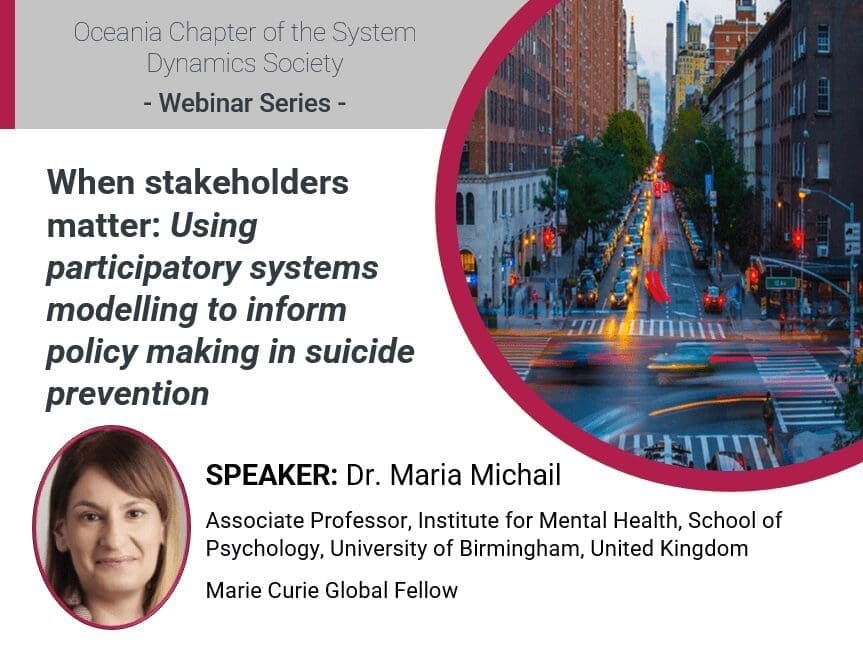
When stakeholders matter: Using participatory systems modelling to inform policy making in suicide prevention
ONLINE, Wednesday, April 5th, 2023, 12:00pm – 1:00pm (AEST – Sydney time)
by Maria MichailThis seminar will highlight the value of adopting a participatory modelling approach when developing complex systems models. SEYMOUR (System Dynamics Modelling for Suicide Prevention), an EU funded programme of work, will develop and evaluate a system dynamics model to inform youth suicide prevention policy, planning and implementation in Australia and the UK. We describe the process of bringing together a diverse group of stakeholders across different disciplines and types of expertise (e.g., young people with lived and living experience of self-harm/suicidal behaviour, carers, healthcare professionals, data scientists, service commissioners and policy makers) to collaboratively identify local needs and help us understand the dynamic complexity of the risk factors underlying suicidal behaviour within a complex health and social care services system. Stakeholder insight into contextual barriers and facilitators for the translation of interventions into practice can guide the development of locally relevant implementation strategies.
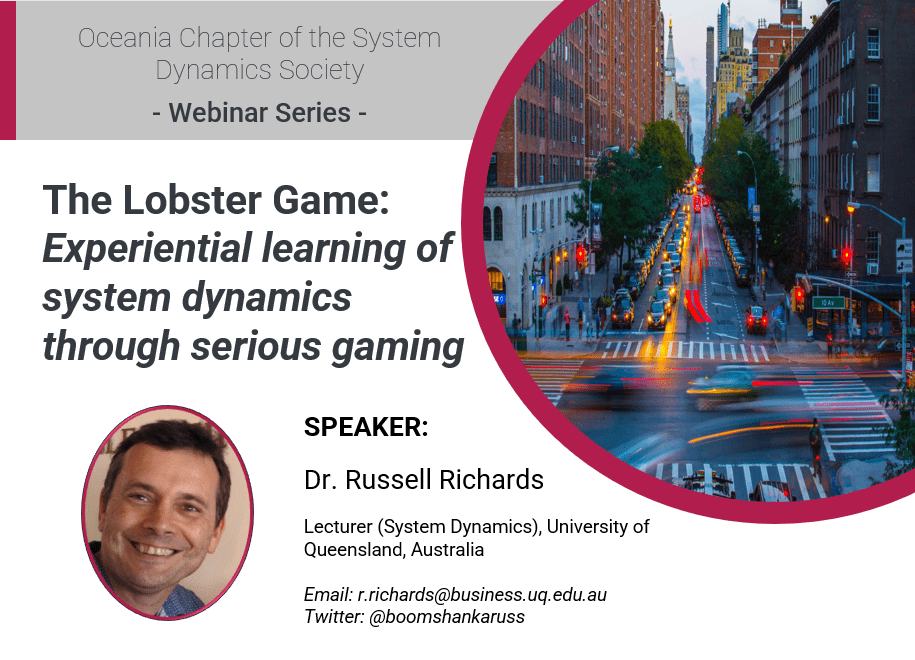
The Lobster Game: Experiential learning of system dynamics through serious gaming
ONLINE, Wednesday, November 9th, 2022, 12:00pm – 1:00pm (AEST – Brisbane time)
by Russell RichardsThe Lobster Game (https://lobstermodel.web.app/) is a web-based system dynamics (SD) model that was developed to help meet the learning objectives of a System Dynamics course taught at the University of Queensland (Business School), Australia. The scope was to represent a well-managed fishery dominated by international live exports, where fishing effort was regulated but also strongly influenced by disruptions to market dynamics. The Lobster Game is a computer-based app developed in Unity3D. The motivation for using a serious game approach is its capacity to foster experiential activity-based learning, moving away from the standard didactic approach. This seminar will present the motivation for gamifying a SD model, the mechanics of the SD model itself and early insights into its utility as a teaching tool. The Lobster Game was developed as part of the ‘UQ Cases’ project using funding from the UQ Business School and was introduced to students in July 2022.
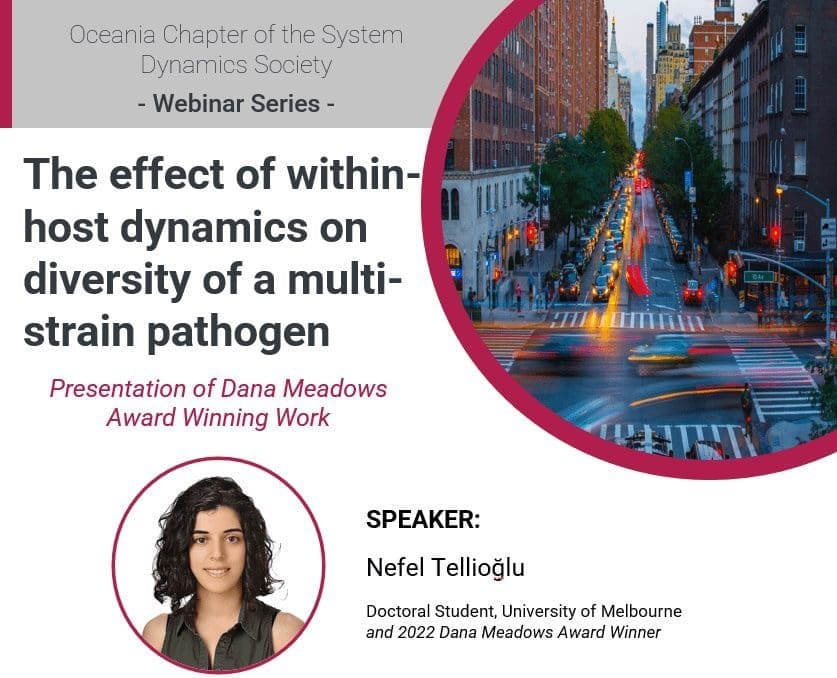
The effect of within-host dynamics on diversity of a multi-strain pathogen: Presentation of Dana Meadows Award winning work
ONLINE, Wednesday, September 28th, 2022, 12:00pm – 1:00pm (AEST)
by Nefel TellioğluMulti-strain pathogens cause millions of infections annually. High strain diversity complicates control of multi-strain pathogens. We have limited understanding about how diversity is maintained in populations given that strains compete both directly (within an individual host) and indirectly (via host immunity). Previous studies tend to make simplifying assumptions about direct competition. We propose an agent-based model to compare the dynamics of multi-strain pathogens under different assumptions about direct competition between strains. We find that direct competition can affect epidemiological dynamics. Our results suggest that while direct and indirect competition can each decrease strain diversity when they act in isolation, they may increase strain diversity when they act together. We argue that studies using multi-strain transmission models should examine sensitivity to assumptions about direct competition. Omitting consideration of direct competition can lead to inaccurate estimates of the effectiveness of control strategies as changes in strain diversity shift the level of direct strain competition.
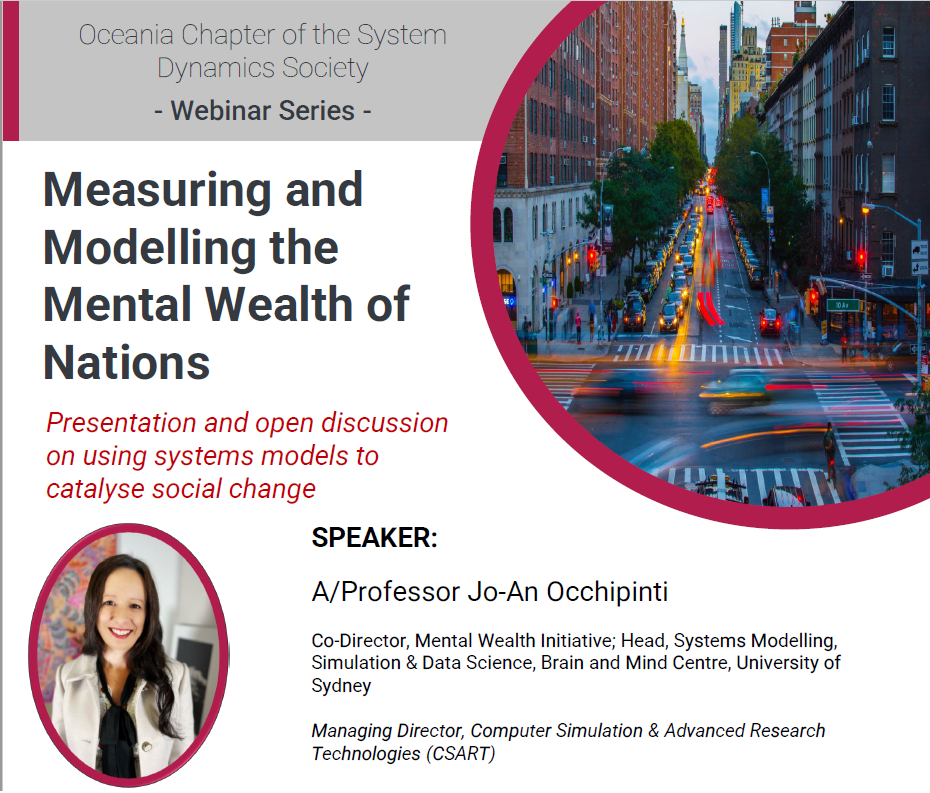
Measuring and modelling the mental wealth of nations: Presentation and open discussion on using systems models to catalyse social change
ONLINE, Thursday, June 23rd, 2022, 12:00pm – 1:00pm (AEST)
by Jo-An OcchipintiThe COVID-19 pandemic has exposed the deep links and fragility of economic, health and social systems. Discussions of reconstruction include renewed interest moving beyond GDP and recognising ‘human capital’, ‘brain capital’, ‘mental capital’, and ‘wellbeing’ as assets fundamental to economic reimagining, productivity, and prosperity. A/Professor Occhipinti will introduce the concept of Mental Wealth and the ambitious program of the Mental Wealth Initiative harnessing the transdisciplinary science of complex systems to measure and model a nation’s Mental Wealth. This program is working to understand the extent to which policy-mediated changes in economic, social, and health sectors could enhance collective mental health and wellbeing, social cohesion, and national prosperity. The presentation will be followed by an open discussion on the use of systems modelling to catalyse social change.
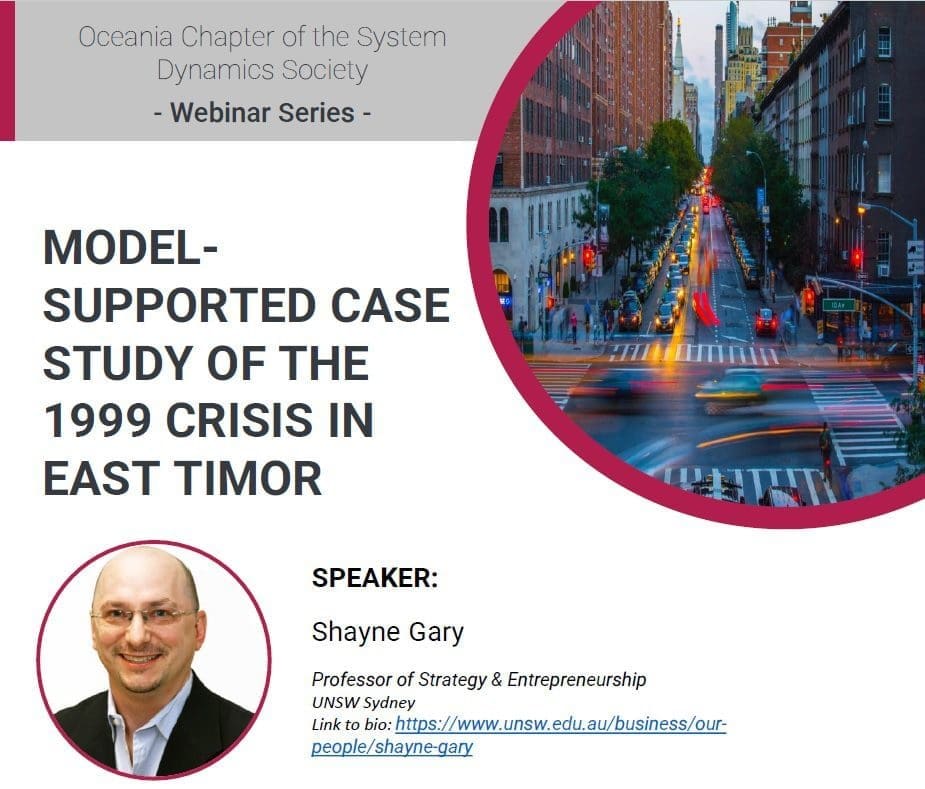
Model-supported case study of the 1999 crisis in East Timor
ONLINE, Wednesday, November 3rd, 2021, 12:00pm – 1:00pm (AEST)
by Shayne GaryThis study explores the use of a system dynamics (SD) model-supported case study to analyse potential future Australian Defence Force designs for an Australian led generic stability operation within the Asia-Pacific region. The 1999 crisis in East Timor serves as the historical case study for the model because it closely matches the scenario of interest. Model assumptions were based on data collected from: (1) interviews of subject matter experts (SMEs), (2) written publications about the 1999 East Timor crisis, and (3) expertise of core project team members. Simulation runs match the dynamics of the historical case and the model can be calibrated to represent future stability operations to evaluate the effectiveness of alternative Force designs.
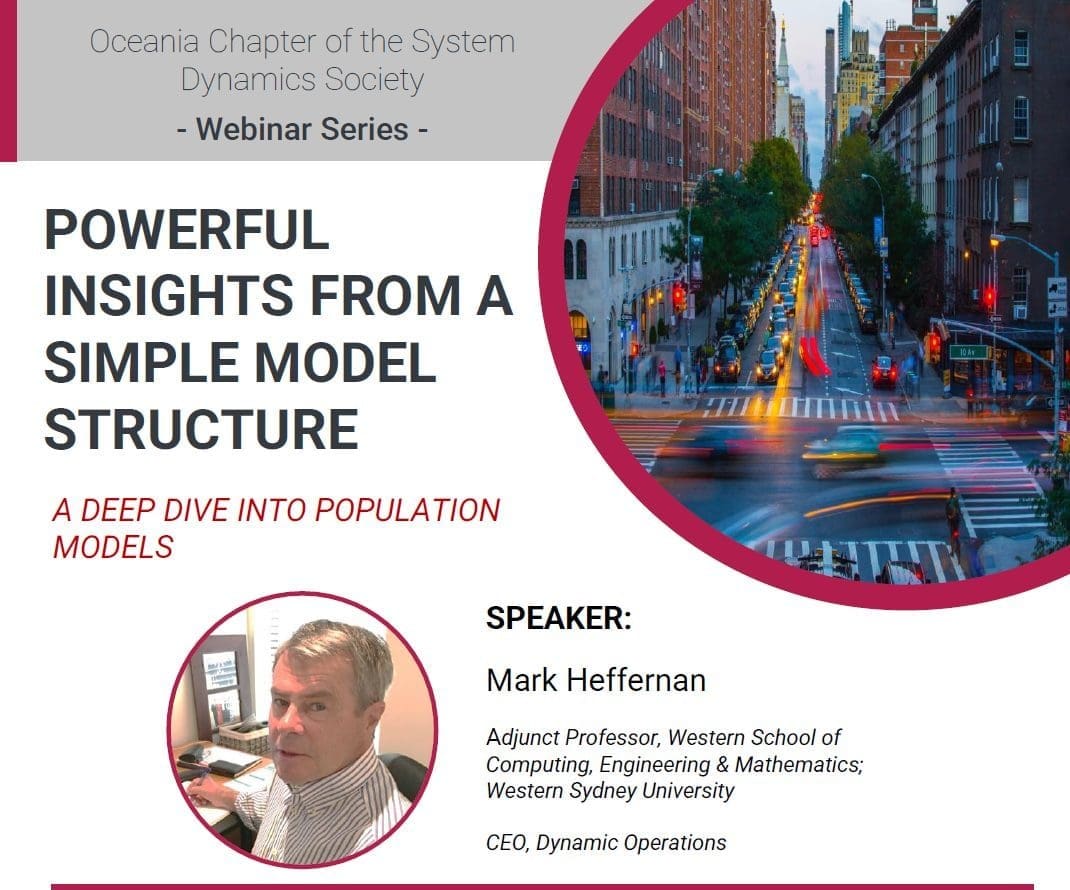
Powerful insights from a simple model structure: A deep dive into population models
ONLINE, Wednesday, August 11th, 2021, 12:00pm – 1:00pm (AEST)
by Mark HeffernanSimple models of local, regional and national population dynamics are often the backbone and the starting place of larger social, ecological, technological and health system dynamics models. Their embedded nature means they are often overlooked as a potential source of powerful insights on their own. In this seminar we will present a range of population models, from single stock models to more complex models incorporating demographic characteristics and discuss ways in which these models can generate powerful insights in a variety of different contexts such as the current global COVID-19 pandemic. We will also discuss the policy implications of applying different methodologies, and more broadly how such models can be used to test scenarios and inform public policy.
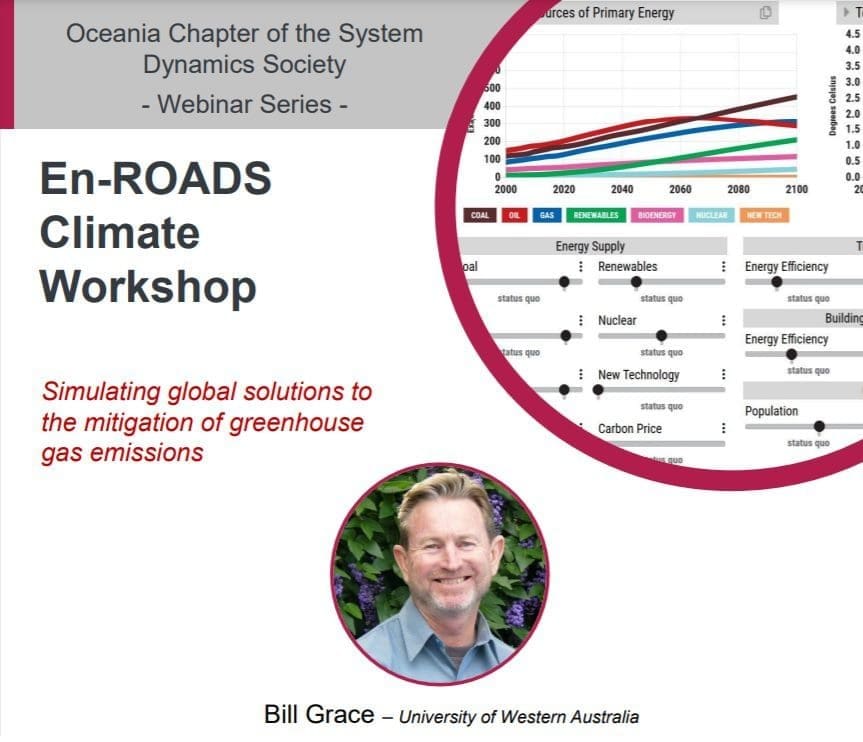
En-ROADS Climate Workshop: Simulating global solutions to the mitigation of greenhouse gas emissions
ONLINE, Wednesday, May 12th, 2021, 12:00pm – 1:00pm (AEST)
by Bill GraceEn-ROADS is leading edge (system dynamics) simulation software developed by Climate Interactive, a non-profit think tank in the US, in conjunction with MIT-Sloan and Ventana Systems. This audience-led workshop aims to improve peoples’ mental model of climate policies by exploring for themselves the likely consequences of energy, economic growth, land use, and other policies and uncertainties’ impact on the Paris Agreement of limiting global warming to less than 2°C.
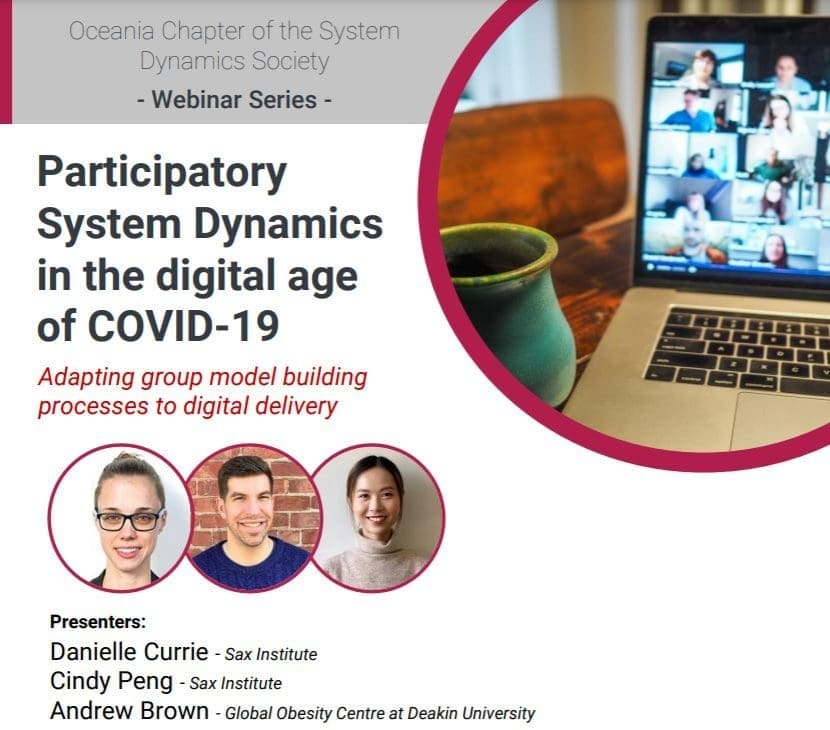
Participatory System Dynamics in the digital age of COVID-19: Adapting group model building
processes to digital delivery
ONLINE, Thursday, April 8th, 2021, 12:00pm – 1:00pm (AEST)
by Danielle Currie, Cindy Peng, and Andrew BrownGroup model building (GMB) is an important part of many of the system dynamics projects currently underway in Oceania region. When the global COVID-19 pandemic, and all its associated restriction, hit in early 2020 it forced many SD practitioners to rapidly adapt the way they approach and deliver GMB processes. In this seminar, Andrew Brown from the Global Obesity Centre at Deakin University and Danielle Currie and Cindy Peng from the Sax Institute will share their early experiences rapidly adapting in-person GMB workshops to an online environment. They will share tips and tricks, and lessons learned, as well as reflect on the role online tools could play in the way SD projects are delivered in a postCOVID era.
